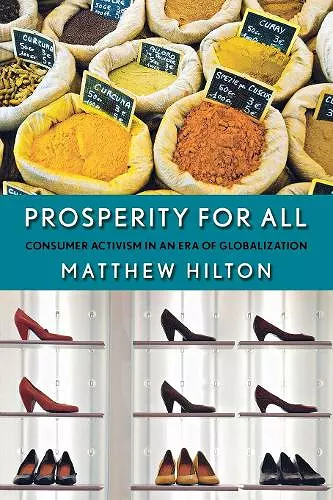Prosperity for All
Consumer Activism in an Era of Globalization
Format:Hardback
Publisher:Cornell University Press
Published:14th Jan '09
Currently unavailable, and unfortunately no date known when it will be back
This hardback is available in another edition too:
- Paperback£31.00(9780801475078)

The history of consumerism is about much more than just shopping. Ever since the eighteenth century, citizen-consumers have protested against the abuses of the market by boycotting products and promoting fair instead of free trade. In recent decades, consumer activism has responded to the challenges of affluence by helping to guide consumers through an increasingly complex and alien marketplace. In doing so, it has challenged the very meaning of consumer society and tackled some of the key economic, social, and political issues associated with the era of globalization.
In Prosperity for All, the first international history of consumer activism, Matthew Hilton shows that modern consumer advocacy reached the peak of its influence in the decades after World War II. Growing out of the product-testing activities of Consumer Reports and its international counterparts (including Which? in the United Kingdom, Que Choisir in France, and Test in Germany), consumerism evolved into a truly global social movement. Consumer unions, NGOs, and individual activists like Ralph Nader emerged in countries around the world—including developing countries in Southeast Asia and Latin America—concerned with creating a more equitable marketplace and articulating a politics of consumption that addressed the needs of both individuals and society as a whole. Consumer activists achieved many victories, from making cars safer to highlighting the dangers of using baby formula instead of breast milk in countries with no access to clean water.
The 1980s saw a reversal in the consumer movement's fortunes, thanks in large part to the rise of an antiregulatory agenda both in the United States and internationally. In the process, the definition of consumerism changed, focusing more on choice than on access. As Hilton shows, this change reflects more broadly on the dilemmas we all face as consumers: Do we want more stuff and more prosperity for ourselves, or do we want others less fortunate to be able to enjoy the same opportunities and standard of living that we do? Prosperity for All makes clear that by abandoning a more idealistic vision for consumer society we reduce consumers to little more than shoppers, and we deny the vast majority of the world's population the fruits of affluence.
Hilton's fine book traces the history of the consumer movement, focusing on how its agenda has changed and how, in the process, it has neglected two critical issues, overconsumption by some groups and underconsumption by others.... The powerful narrative makes insightful links to broader social and global issues. Highly recommended.
* Choice *Taking a refreshing view of the history of consumption, Matthew Hilton identifies a change in the relative weight given by consumer groups from a 'focus on access to one of choice' and thus redefines consumer history according to the historical balance between social welfare and individual gain as the dual goals of consumer organizations.... Prosperity for All deserves attention for its insightful use of the consumer movement to help explain larger and economic and social trends. The international transformation of consumer politics from an emphasis on democracy and social justice to the neoclassical prominence of individual choice stands as an important narrative of twentieth-century global history.... Perhaps most importantly, Hilton successfully incorporates consumer activists—emphasizing the links between the individual battles against breast milk substitutes, crop modification, and pharmaceutical dumping—into the greater story of international social movements.
-- Christopher R. W. Dietrich * ItinerarISBN: 9780801446443
Dimensions: 235mm x 155mm x 25mm
Weight: 907g
328 pages